Last month, developer Campo Santo issued a DMCA takedown request to YouTuber PewDiePie following a controversial livestream. But where do you stand legally if you wanted to do the same? Develop asked partner Carolyn Pepper and associate Roch Glowacki from legal practice Reed Smith to explain what you, as a developer, can do.
As with traditional athletes, e-sports competitors and amateur gamers can, in the heat of the moment, make unacceptable comments, the recent PewDiePie incident being an example. This has triggered a debate around the deployment of takedown notices. As live gaming enters the mainstream, should you issue ‘red cards’ for copyright infringements to players on the virtual pitch, court or arena and what are the consequences of doing so?
Under the US Digital Millennium Copyright Act (DMCA) online service providers such as YouTube and Twitch are sheltered from copyright infringement liability provided they comply with certain requirements, including operating a ‘notice and takedown’ system. Mechanisms with similar effects exist in many other jurisdictions – the E-Commerce Regulations apply in the UK, for instance.
The general position is that a host or platform will not be liable for copyright infringement unless they are aware of the infringing material, and so copyright owners need to notify the relevant platform if they think their rights are being infringed. In the case of DMCA notifications, they must adhere to strict requirements for a notice to qualify under the Act.
If you are a developer taking action against a copyright infringer or a misbehaving gamer, you first need to establish that you actually have a right to stop the other person from exploiting your content. It may be tempting to deploy takedown notices as a censorship tool or as a black hat method of marketing (aimed at removing competitors’ online content) but the fact that you dislike something online will not be enough.
There can be serious consequences for those who issue takedown notices under the DMCA, if they knowingly materially misrepresent the fact that the material or activity is infringing – you could be liable for any resulting damage (including legal fees) incurred as a result of any take-down. In the virtual world, where the number of views, subscribers and click-throughs are king, even temporary takedowns can be very damaging as plunging user traffic can have a direct bearing on gamers’ revenues.
If you want to make a complaint it is important to look back at the terms and conditions of the licence you grant to users, investigate the arrangements with your licensees and consider whether an implied licence might be in play, or a copyright exception such as fair use or fair dealing might apply.
There is also the potential for reputational damage to consider. The relationship between gamers and developers is a symbiotic one. The gaming community generally respects that relationship and will often defend it. Developers stand to profit from a gaming influencer’s publicity whilst gamers try to make a living by exploiting the developers’ content. Although most developers will own the copyright in their games and will likely have the right to terminate a licence to stream/monetize their content, where such content is used against the terms of their licences, doing so can have adverse PR consequences unless it is done with good reason.
If you decide to issue a notice, you will want to ensure that it contains a complete and clear description of the infringing content that you are seeking to protect. This will usually include providing a specific link to the infringing material. The sites hosting the content will need more than just usernames or channel URLs if they are to swiftly identify the content in question. Make sure that you are as specific as possible because deficient notices may result in delays that could increase reputational damage to your brand.
If you are on the receiving end of a takedown notice, make sure that you review it carefully (and ask for a copy of it, if it wasn’t forwarded to you) as failure to comply with DMCA requirements, for example, might render the notice ineffective. Once submitted, sites such as YouTube will usually take the allegedly infringing content (such as a video) down temporarily. Gamers can dispute takedown requests by filing a counter notice but they very often do not do so. If a counter notice is filed, the complainant must either retract its takedown notice or escalate to court proceedings. The video will normally be reinstated if no further action is taken.
Given that issuing a DMCA notice can be stepping onto a path that may end up in court, if you make a complaint, you need to be prepared for the consequences that might follow. Therefore, developers should remember to tread carefully before flexing their muscles, taking the plunge and risking getting it wrong. At the same time, gamers should respect the fact that the content they generate is based on the fruits of developers’ intellectual efforts, who can take steps to prevent use of their games if gamers overstep the mark.

 MCV/DEVELOP News, events, research and jobs from the games industry
MCV/DEVELOP News, events, research and jobs from the games industry




